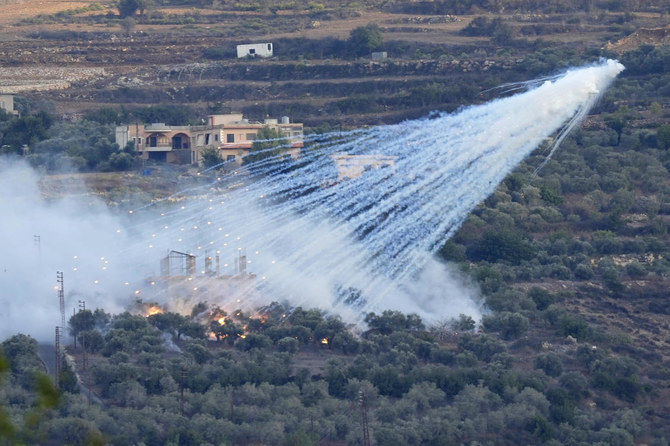
- ARAB NEWS
- 27 Apr 2024

BEIRUT: US National Security Adviser Jake Sullivan said Friday that he has discussed with Israeli officials the volatile situation along the Lebanon-Israel border, adding that a “negotiated outcome” is the best way to reassure residents of northern Israel.
Speaking to reporters in Jerusalem, Sullivan said that Washington won’t tolerate threats by Lebanon’s militant Hezbollah group, which has been attacking Israeli military posts along the border since a day after the Israel-Hamas war began on Oct. 7.
Over the past two months, Israel has evacuated more than 20,000 of its citizens from towns and villages along the border with Lebanon, some of whom have expressed concerns that they have no plans to return home as long as Hezbollah fighters are deployed on the Lebanese side of the border.
“We need to send a clear message that we will not tolerate the kinds of threats and terrorist activity that we have seen from Hezbollah and from the territory of Lebanon,” Sullivan told reporters in Jerusalem.
“The best way to do this is to come up with a negotiated outcome,” Sullivan said, adding that such an outcome will ensure that “those Israeli citizens in those communities up on the northern border can know that they are not going to be subject to an attack that will take their lives or destroy their communities.”
Sullivan said: “That threat can be dealt with through diplomacy and does not require the launching of a new war.” Still, the US official said that such a step requires not just diplomacy, but deterrence as well.
Israel and Hezbollah are bitter enemies that fought a war in the summer of 2006. Israel considers the Iran-backed Shiite militant group its most serious immediate threat, estimating that Hezbollah has around 150,000 rockets and missiles aimed at Israel.
Since the end of the 34-day war in 2006, thousands of UN peacekeepers and Lebanese troops were deployed along the border. The border had been mostly quiet over the years apart from sporadic violations, but it all changed since the Israel-Hamas war started.
Since Oct. 8, Hezbollah fighters have carried out scores of attacks — mostly targeting Israeli military posts along the border. Israeli artillery and warplanes have also been attacking areas on the Lebanese side of the border.
On Friday, an Israeli drone dropped leaflets on a border village, warning its residents that Hezbollah is endangering their lives by using the area to launch attacks against Israel.
Lebanon’s state news agency reported that an Israeli drone struck a house Friday in the southern village of Yarin, wounding several people. It gave no further details.
On Thursday, an Israeli airstrike on the southern village of Markaba killed a Hezbollah fighter, raising to 101 the total number of the group’s members who have been killed since the latest round of fighting began.
Hezbollah official Ali Daamoush was defiant in his Friday prayers sermon, vowing that the group won’t stop attacks along the border and also has no plans to move away from the frontier.
“The Israeli-American brutality can only be stopped by the resistance that can inflict losses on the enemy,” Daamoush said. “Intimidation and threats will not change the stance of the resistance and its presence on every inch of the south” of Lebanon.
AP